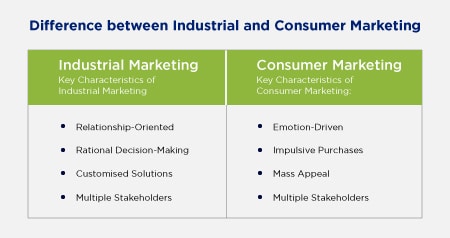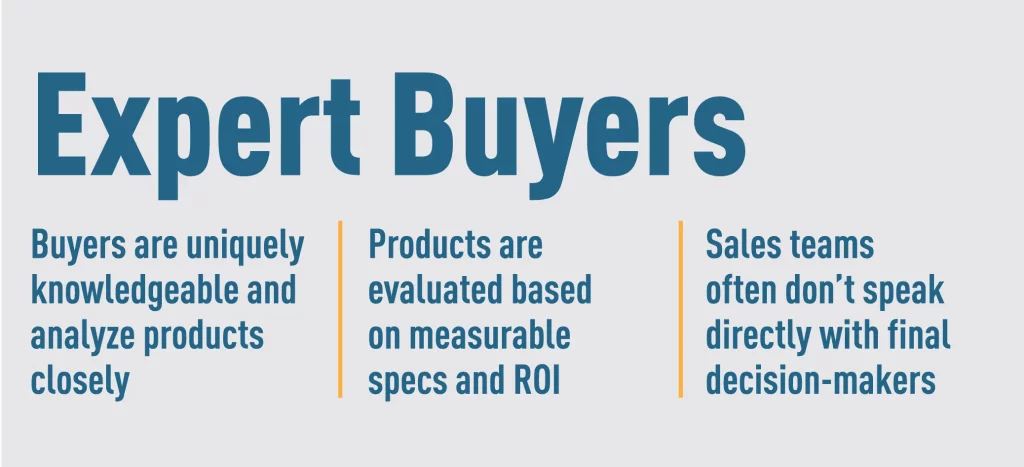
Industrial marketing caters to businesses selling products and services to other companies rather than individual consumers. Unlike consumer marketing, it involves longer sales cycles, higher-value transactions, and complex decision-making processes involving multiple stakeholders.

Roughly 57% of industrial buyers compare their suppliers online before speaking directly to the firm. This statistic means your content marketing strategy is vital because it’s your first interaction with most buyers. As a result, aligning your marketing strategies with the buyer’s journey can significantly enhance engagement and conversion rates.
Understanding and adapting to the industrial professional’s buying process is essential for successful marketing. This guide will take you through the nuances of industrial marketing, providing insights on how to tailor strategies to meet the specific needs of industrial buyers.
Quick Takeaways
- Industrial marketing involves selling products and services to other companies.
- There could be multiple decision-makers contributing to the process.
- Learning how industrial buyers operate is vital.
- Success is dependent on your marketing strategy.
The Three Stages of the Industrial Buying Process
Every industrial purchase involves three stages. Discovering these stages offers a guide as you learn the nuances of industrial marketing.
1. Research
When researching, the buyer searches with the intent to discover answers to questions, learn solutions to problems, or identify providers of a particular product or service. In response, the seller should aim to be discovered by the buyer as early as possible in the buying process to maximize sales. The earlier this discovery, the more influence the seller can have on the often long buying process.
2. Evaluation
Next, the buyer develops a short list of products or service providers and begins evaluating each in depth. The seller’s job is to qualify their business and prompt a sales conversation. Note that much of the industrial buying process happens before contact is ever made with a salesperson. An educational website with engaging content is critical if you want to attract the right attention.
3. Purchase
The buyer has reached the point of decision. Marketing should have done its job, and it’s up to sales to close the deal.
How to Align Your Industrial Marketing Strategy with Your Buyer Process
Because the mindset of a buyer – your potential customer – is very different during each of the three distinct phases of the buying process, you must carefully consider how you can fulfill their needs and solve their problems during each. These six steps should help guide you along the way.
1. Identify Your Buyer
Who is involved in the buying process within your target audience’s company? Engineers seeking specs? Purchasing departments seeking low bids? Business owners seeking long-term partnerships?
You must clearly identify your buyer before you can think about making a sale. If you don’t, you’ll be inefficient in your marketing efforts.

2. Identify the Buyer’s Needs
Which problems are your buyers trying to solve?
Are they trying to overcome challenges?
What solutions do they think they need?
What solutions do they actually need?
Answer these questions, and you’ll start down the path of truly providing value for your potential customer.
3. Learn Where Buyers Get Information
Where do your buyers gather information online? Do they first go to search engines like Google and Bing, or are there primary reference industry directories and trade journals? Are industrial sector resources like ThomasNet or GlobalSpec relevant?
Insist on only fishing where the fish are. It’s common sense, but it’s surprising how many companies settle for less.
4. Learn the Specifics of What They’re Trying to Learn
What keywords do you suspect customers are using in their searches? They could be searching by:
- Product
- Service
- Problem
- Solution
Real data can be gathered through sources like the Google Ads Keyword Planner to validate or negate what you suspect to be true.
5. Answer Their Questions
There’s simply no better place than your own website to answer common questions and provide the beginnings of solutions to those problems through written, visual, or watchable content. Educational content actually helps your buyer and begins to establish trust in a way that promotional marketing language very rarely will.
This is web marketing 101.
6. Compel Your Website Visitor to Take a Lead-Generation Action
Right now, your website visitor is an anonymous person. They don’t have a face, name, phone number, or email address. You need to ensure you prompt a real conversation before that anonymous visitor leaves and never comes back.
“Gating” educational content behind a form that requires at least an email address in order to access allows you to trade something of value for your prospect’s contact information. And this, in turn, enables you to take control of the sales conversation.
Tips for Making the Most of Your Industrial Marketing Strategy
Conduct Market Research
Thorough market research is the foundation of effective industrial marketing. Use surveys, interviews, and industry reports to gather information on your target audience. Understanding their needs and pain points helps tailor your marketing messages and solutions to address their specific challenges.
Build a Strong Online Presence
About 67% of the global population uses the internet, so your online presence is crucial. Create a professional, user-friendly website that clearly communicates your products and services. Ensure it includes detailed product descriptions, technical specifications, and case studies that highlight successful applications of your offerings.
Utilize SEO techniques to improve your website’s visibility on search engines. Additionally, maintain active profiles on social media platforms like LinkedIn, where many industrial professionals seek information and network.
Leverage Data and Analytics to Refine Marketing Strategies
Data and analytics are powerful tools that can significantly enhance your marketing efforts. Use analytics to track the performance of your marketing campaigns and understand which strategies are most effective. Monitor website traffic, engagement metrics, and conversion rates to identify areas for improvement.
Network and Build Relationships within the Industry
Building strong relationships within the industry is critical to successful industrial marketing. Attend industry trade shows, conferences, and networking events to connect with potential clients and partners. Building a network of industry contacts can provide valuable insights, open doors to new opportunities, and establish your reputation as a trusted player in the market.
Stay Updated with Industry Trends and Innovations
The industrial sector is constantly evolving with new technologies and trends. Stay informed about the latest developments by subscribing to industry journals, following relevant blogs, and attending webinars and workshops. Understanding the latest trends and innovations can help you anticipate market needs and position your offerings as cutting-edge solutions.
Navigating the complexities of industrial marketing and aligning your strategies with the buying process isn’t easy, but making the effort helps you build successful, long-lasting relationships with industrial professionals.
Become an Expert in Your Industry Today with MIG
Creating engaging and well-written content is a significant piece of the industrial marketing puzzle because it can help establish your company as a thought leader within your industry. From there, you’ll be more likely to attract readers looking for the expertise you provide, and in turn, your readers will likely become buyers.
Marketing Insider Group can help as you develop a content database with our Content Builder Services. Contact us to learn more about the content we create, or book your free consultation with our team.

0 Commentaires